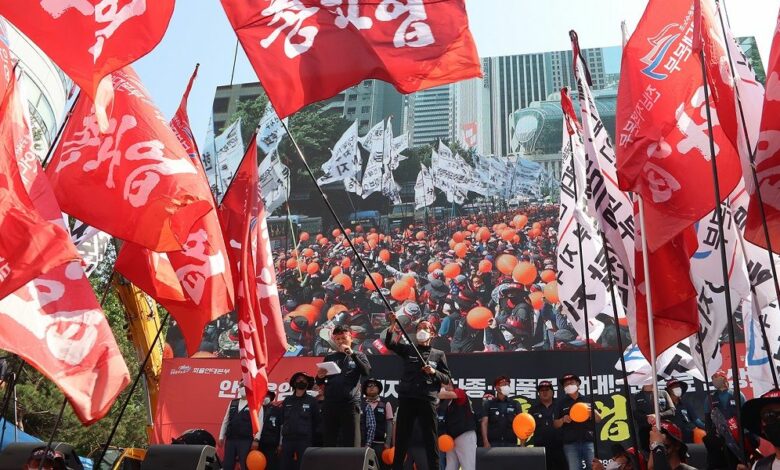South Korea’s striking truckers face back-to-work order if talks fail

South Korea’s government failed to reach a deal with thousands of unionised truckers in the first round of talks on Monday, the fifth day of a mass walkout that has disrupted logistics and crippled several key industries in the country.
The truckers are demanding the government extend and expand a system calculating minimum wages based on operating costs that is due to expire by the end of the year. The unions are calling for the so-called safe rates, which currently apply to the haulage of bulk cement and containers, to be made permanent and coverage extended to all vehicle and freight types.
The country’s ministry of transport is offering to extend the freight rate system for another three years without expanding it to a wider range of drivers. The next session is expected on Wednesday. The failure to resolve the second major strike in less than six months increases the likelihood that President Yoon Suk-yeol will issue an executive order requiring truck drivers to return to work.
Yoon is expected to hold a cabinet meeting on Tuesday to consider a work start order, according to his office, after criticising the strike for holding the national supply chain hostage during an economic crisis. The law allows use of such an order to tackle a serious transport disruption, and those not complying could face cancellation of their trucker licenses, three years in jail, or a fine of up to $22,550.
The strike is disrupting industrial activity, with the government estimating daily losses at about $224m as supplies of cement and fuel for gas stations run short. The ministry warned that the situation could get worse if the railroad union joins the strike on December 2.
If the industrial action continues, cement shipments are expected to drop to 5% of usual levels this week, according to the Korea Cement Association, while the transport ministry estimated most of the construction sites will run out of concrete supplies by Tuesday, adding that the steel industry saw shipments more than halve to 22,000 tonnes on Sunday. Gas stations are also at risk of running out of gasoline and kerosene as early as this week, as around 80% of truckers for major refiners are union members on strike.
The latest government numbers show container port throughput was 21% of normal levels on Monday morning, with Gwangyang, Pyeongtaek-Dangjin and Ulsan ports completely shut by the strikers.
